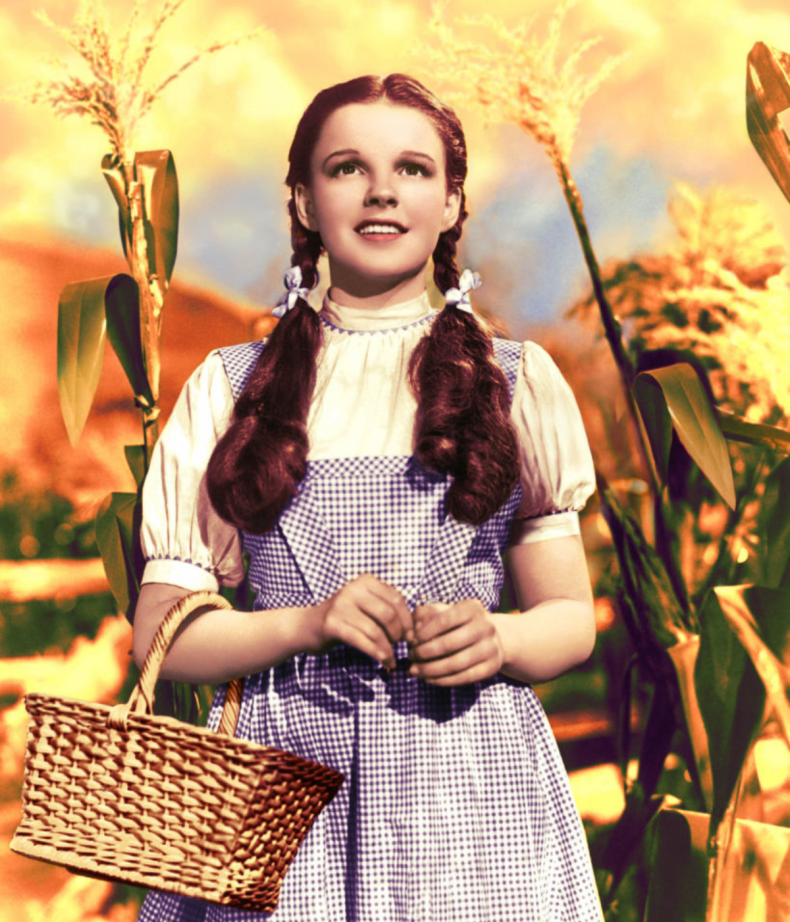A photo of Judy Garland in blackface has resurfaced on social media, with fans jumping to the late child star’s defense.
The image is a still from the film Everyone Sings from 1938, and shows a teenage Garland painted to have darker skin, large white lips and dreadlocks. Garland played Judy Bellaire in the musical comedy, who joins a musical show as a blackface singer to escape her dysfunctional family.
Bettmann
Although the film was released 85 years ago, many people first learned of its existence after the still was shared by X user @browardbully on August 16. Combining the image with a shot of Garland in the film’s musical The wizard of Oz as of the following year, @browardbully wrote: “two movies. A year apart. Same b****. Thanks Gen Z for teaching me this.”
The post received more than 36 million views and caused an uproar online, but not because of blackface. Fans jumped to the actor’s defense, drawing attention to Garland’s infamous abuse at the hands of her parents and studio executives.
“She was a little girl forced to do this,” X user Queen Minaj posted. “It wasn’t 2023.”
“Do you think she had any say as a minor or a woman in the 1930s? Do you think the abusive management she had and her parents would allow her to turn down the role?” Alex Silva wrote.
“A walk in their shoes can elicit some empathy,” commented KJ-isms.
“Cancel someone who did it as an adult and is still alive,” Hozonkai wrote. “She’s not a former child actress who died 54 years ago.”
“Please take the time to understand not only what Hollywood was like, but especially what Judy went through,” Yuh added.
Born Frances Ethel Gumm in 1922, Garland first performed on stage at age 2 and quickly became a musical sensation. She was signed by Metro-Goldwyn-Mayer in 1935 and starred in it most famous movie, The wizard of Oz (1939), while under contract with the studio.
However, Garland’s tragic early life is well documented. Her parents moved from Grand Rapids, Minnesota, to Lancaster, California, when Garland was 4, with her vaudeville actress mother determined to make her three daughters stars.
From the age of 10, Garland was fed amphetamines in the morning and sleeping pills at bedtime, and from the time she joined MGM, her diet was constantly monitored.
During her seven years at the studio, the child star worked a grueling schedule, which included three hours of school, followed by singing practice and a full day of filming. By age 15, Garland was addicted to pills and while filming wizard of oz, She is said to have subsisted on a diet of black coffee, chicken soup and up to 80 cigarettes a day to ensure she was as thin as possible.

Silver Screen/MoviePix Collection
His tough schedule was allegedly accompanied by sexual harassment. Gerald Clarke, author of Get Happy: The Life of Judy Garland—says the actor was groped by producer and studio head Louis B. Mayer, while her ex-husband Sidney Luft said the star was harassed by the actors playing the munchkins. The wizard of oz set
As an adult, Garland’s career was tumultuous, with several lows alongside roaring highs. He also struggled with addiction and financial problems, and died in 1969 of a barbiturate overdose. She was only 47 years old.
In response to @browardbully’s tweet, several users highlighted Garland’s work with the civil rights movement in the 1960s.
“I’m not ‘advocating’ blackface by any means, but Judy Garland had absolutely no say in doing it (her whole career she was forced into many things), she was actually a HUGE SUPPORTER of the civil rights movement” , wrote the X. user I’m annette.
“He’s done more for the civil rights movement than most of us,” this kind of duck posted.
“May I ask what conversation you are trying to have?” wrote user X Myth. “If you understand that Judy was forced into these roles as a child and you know that as an actual adult she was an activist in the black community, then what’s the point of bringing her up as the problem here?”
